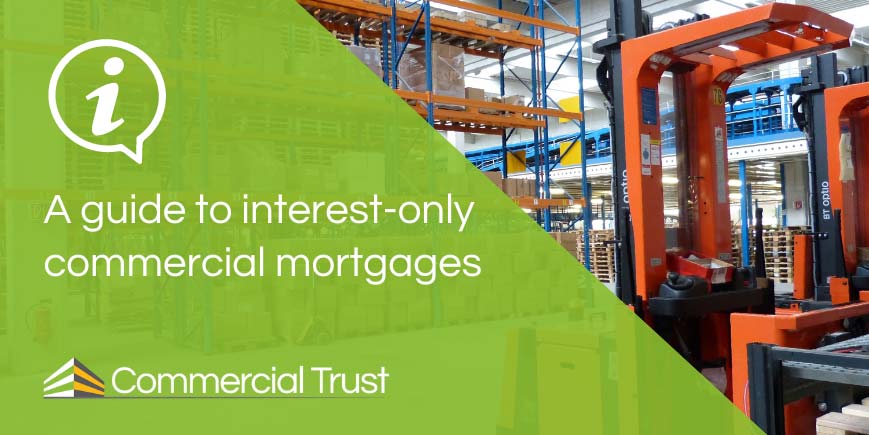This information should not be interpreted as financial, tax or legal advice. Mortgage and loan rates are subject to change.

Categories: commercial mortgages | guides | commercial mortgage guides
Commercial investment mortgages play a crucial role in financing real estate investments for business premises. Whether you are an established company seeking to expand your property portfolio, or an aspiring entrepreneur looking to enter the commercial market, understanding the intricacies of commercial investment mortgages is essential.
This guide aims to provide a comprehensive overview of commercial investment mortgages, exploring key concepts, eligibility criteria, the application process, and the benefits and challenges you need to know about.
Contents
- Understanding commercial investment mortgages
- Expert tips for successful commercial investment mortgage applications
- Eligibility criteria for commercial investment mortgages
- Types of commercial investment mortgages
- The application process
- Key considerations for commercial investment mortgages
- Benefits and risks of commercial investment mortgages
- Finding the right commercial investment lender
- Considerations for commercial investment mortgage refinancing
- Managing risks of commercial investment mortgages
Understanding commercial investment mortgages
A commercial investment mortgage is a loan specifically designed for purchasing or refinancing commercial properties intended for investment purposes. The alternative would be to buy or remortgage a property you intend to run your own business from, which are referred to as owner-occupier commercial mortgages.
These mortgages are different from residential mortgages and typically involve larger loan amounts, higher interest rates, and different eligibility requirements.
Commercial investment mortgages can be used to finance a wide range of properties, including office buildings, retail spaces, industrial complexes, and hospitality premises.
Eligibility criteria for commercial investment mortgages
To qualify for a commercial investment mortgage, lenders assess various factors, the most important is the anticipated or actual rental income, which is how monthly mortgage payments will be paid.
The deposit, or equity in the property, will determine the loan to value ratio of your investment. This will make clear how much you need to borrow from the lender.
Your credit score may influence the lenders that you can work with, which in turn might affect rates you can get. Some lenders actively help applicants who have poor credit, others don’t.
Lenders will also consider a borrower’s experience in owning commercial properties. Some lenders accept experience in buy to let property; others will want commercial mortgage experience.
LTV ratio and down payments
Loan to value (LTV) is an important factor in commercial investment mortgages. It refers to the ratio of the loan amount to the appraised value of the property.
Lenders typically have maximum LTV ratios they are willing to lend. The lower the LTV, the lower the risk for the lender, which typically results in more favourable loan terms. Higher LTV ratios typically mean the deals you are eligible for have higher interest rates.
Down payments are a key component of commercial investment mortgages. Lenders usually require a down payment ranging from 25% to 40% of the property’s purchase price.
The size of the down payment depends on factors such as the industry the property operates in and the rental income the property generates (with a remortgage) or is expected to generate (with a purchase – the estate agent should be able to tell you what this would be).
It is important to have a sufficient amount of capital available for the down payment, as it demonstrates your commitment to the investment and reduces the lender’s risk.
Types of commercial investment mortgages
Commercial investment mortgages come in various forms, each tailored to different investment strategies and borrower needs. Common rate types include:
- Fixed-rate mortgages, which offer a stable interest rate over a given period, so monthly payments are the same.
- Variable-rate mortgages, which have an interest rate that fluctuates based on market conditions, potentially offering lower initial rates but also with risk the rate may go up.
Types of mortgage payments
You can choose to make payments on a commercial investment mortgage in the following two ways:
- Interest-only mortgages require borrowers to pay only the interest portion of the loan, allowing for lower monthly payments but requiring a repayment plan for the principal amount at the end of the term. If you did not repay the principal borrowing, you would not own the property at the end of the term.
- Capital repayment mortgages require the borrower to pay the interest and the principal cash lump sum borrowed each month. At the end of the term, you would own the property.
The application process
The application process is very similar to any mortgage, it involves:
- Preparing documentation – gather necessary financial documents, such as tax returns, financial statements, bank statements, and property information.
- Research lenders – identify reputable lenders specialising in commercial investment mortgages and compare their loan products, terms, and interest rates. A specialist mortgage broker can help with this.
- Submitting the application – complete the lender’s application form, providing accurate and detailed information about the property, borrower’s financials, and investment plan. A mortgage broker would do this for you.
- Underwriting and due diligence – the lender reviews the application, assesses the property’s value, conducts credit checks, and evaluates the borrower’s ability to repay the loan.
- Loan approval and closing – if the application is successful, the lender issues a loan commitment, detailing the terms and conditions. Upon acceptance, legal documents are prepared, and the loan is closed.
Key considerations for commercial investment mortgages
Before pursuing a commercial investment mortgage, it is important to consider several factors:
- Property selection – conduct thorough market research and due diligence to identify properties with potential for growth and profitability.
- Financial analysis – assess the property’s income potential, cash flow projections, operating expenses, and return on investment to ensure it aligns with your investment goals.
- Loan structure and terms – evaluate interest rate, LTV ratio, repayment terms, early repayment penalties, and any additional fees associated with the mortgage.
- Exit strategy (interest-only commercial mortgages) – have a well-defined exit strategy in place, outlining how you plan to repay the loan, whether through property sale, refinancing, or other means.
Exit strategy
When entering into the commercial investment market, and selecting an interest-only commercial mortgage, it’s crucial to have a well-defined exit strategy (way of paying back the cash lump sum you borrowed). Planning your exit strategy in advance can help you maximise returns and achieve your investment goals.
Consider the following exit strategies:
- Property sale – property values can go up and down. If you hope to make a profit from eventually selling your property, you need to be able to invest over several years to overcome fluctuations in the market until a point at which your property is worth more than you paid for it. Monitor market conditions and engage with commercial real estate agents to determine the optimal time to sell. Assess property valuations, rental income potential, and market demand to make informed decisions.
- Refinancing – refinancing your commercial investment mortgage can offer several benefits. It allows you to access any equity built up in the property, adjust loan terms, or secure a lower interest rate. Refinancing can free up capital for other investments, or improve cash flow by reducing monthly mortgage payments. It also means you can keep the property for longer.
- Sale and leaseback – if you were an owner-occupier, you might consider a sale and leaseback arrangement, which involves selling the property to a buyer and simultaneously entering into a lease agreement as the tenant. This strategy allows you to unlock capital while maintaining occupancy.
- Portfolio optimisation – regularly evaluate your commercial property portfolio to identify underperforming assets, or those that no longer align with your investment strategy. Consider selling such properties to free up capital for more promising opportunities, or to rebalance your portfolio.
Remember that having a well-planned exit strategy from the outset of your commercial investment mortgage can provide you with flexibility and peace of mind as you navigate the dynamic UK commercial property market.
Benefits and risks of commercial investment mortgages
Commercial investment mortgages offer several benefits, including:
- Wealth creation – property market investments can generate ongoing rental income and long-term appreciation, contributing to wealth accumulation.
- Portfolio diversification – commercial properties provide an opportunity to diversify investment portfolios, reducing risk exposure to a single asset class.
- Tax advantages – mortgage interest payments and depreciation expenses may offer tax deductions, reducing the overall tax liability (make sure you seek professional tax advice).
However, commercial investment mortgages also carry risks, such as:
- Market volatility – the property market can go up and down, affecting property values and rental income.
- Vacancy risk – property vacancies can affect cash-flow and the ability to keep up with mortgage payments.
- Interest rate risk – variable-rate mortgages are susceptible to interest rate fluctuations, potentially increasing borrowing costs.
Finding the right commercial investment lender
When seeking a commercial investment mortgage, finding the right lender is crucial. Consider the following factors during your search, but remember, a specialist broker like Commercial Trust can do all of this for you, saving you time and considerable work. Some of these factors are almost impossible to research as a consumer:
- Reputation and track record – research the lender’s reputation and track record. Read customer reviews, testimonials, and case studies to gauge their credibility and customer satisfaction.
- Loan products and terms – compare loan products and terms from different lenders. Look for competitive interest rates, flexible repayment options, and favourable loan to value ratios.
- Customer service and support – evaluate the level of customer service and support provided by the lender. A responsive and knowledgeable team can guide you through the process and address any concerns or questions you may have.
- Turnaround times – enquire about the lender’s processing times. Administering a commercial investment mortgage application takes time (weeks, not days), but some lenders are more efficient than others are.
Considerations for refinancing
Refinancing a commercial investment mortgage can offer several advantages, including accessing equity, securing better interest rates, and adjusting loan terms.
Consider the following factors when contemplating mortgage refinancing:
- Equity position – determine the amount of equity you have in the property (how much of the money invested in the property is yours, versus how much has been lent to you). The less you need to borrow, typically the lower the interest rates available to you.
- Current interest rates – monitor the interest rate environment. Are rates low or high? If interest rates are predicted to increase, arranging a new deal as soon as you can might mean you can secure lower monthly payments. Similarly, if rates are about to fall, it is worth seeing when competitive deals become available. Commercial Trust issues a weekly email ,which updates our subscribers on this and other industry news, you can subscribe for free here.
- Financial goals – evaluate your financial goals and determine how refinancing aligns with them. Whether you aim to reduce monthly payments, shorten the loan term, or access funds for other investments, refinancing should support your objectives.
- Costs and fees – understand the costs associated with refinancing, such as application fees, valuation fees, and legal fees. Compare the potential savings from refinancing with the costs involved to ensure it is financially beneficial.
- Loan terms – consider whether you want to adjust the loan terms during refinancing. You may opt for a shorter loan term to pay off the mortgage sooner or switch from a variable-rate to a fixed-rate mortgage for increased stability, for example.
Managing risks of commercial investment mortgages
Commercial investment mortgages involve risks that borrowers should be aware of and manage effectively. Consider the following risk management strategies:
- Property due diligence – conduct thorough property due diligence, including inspections, environmental assessments, and title searches. Identify any potential issues that may impact the property’s value or rental income.
- Cash flow analysis – perform a comprehensive cash flow analysis to ensure the property’s rental income can cover mortgage payments, operating expenses, and void periods (the gap between one tenant vacating the property and another moving in). Factor in potential economic downturns, or changes in market conditions.
- Contingency planning – establish contingency plans for unforeseen circumstances, such as property damage, tenant default, or economic downturns. Having reserves or alternative income sources can help mitigate financial risks.
- Choice of interest rate type – if rates are competitive when you remortgage, but are predicted to rise, you may want to fix your rate to protect you from mortgage payments increasing. If rates are high, but predicted to decrease, a variable rate would prevent you being tied to a higher rate, if rates drop.
- Property and liability insurance – adequate insurance coverage protects against potential property damage, liability claims, or business interruptions. Consult with insurance professionals to ensure you have the appropriate coverage for your investment property.
Expert tips for successful commercial investment mortgage applications
To improve the chances of a successful application, consider the following tips below. However, it is important to note that a mortgage broker can go through this list on your behalf, saving you time.
- Strengthen your creditworthiness – maintain a good credit score and keep outstanding debts to a minimum, where possible.
- Prepare a comprehensive business plan – outline your investment strategy, financial projections, and demonstrate your experience and ability to manage commercial properties.
- Work with professionals – seek guidance from property market professionals, mortgage brokers, and accountants to ensure a thorough understanding of the investment and financing process.
Seek advice from Commercial Trust
As a specialist commercial investment mortgage broker, Commercial Trust has access to a wide range of lenders and can help identify the most suitable loan option for your investment goals. We will also take all the tiresome and time-consuming work in getting the deal to completion away from you. Contact us today.






